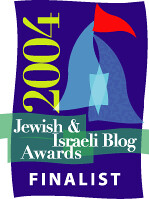This coming Monday night is Tish'ah B'Av, a Jewish fast day commemorating the destruction of the Holy Temple in Jerusalem. This is a piece I wrote for Tish'ah B'Av 2002.
Renewing our Days
We trudged out into the night at its very beginning, just after the sun had slipped away and as the dark was spreading across the mid-summer sky. As we walked, step after heavy step across a wet field and then across unstable gravel, we felt the seriousness of the evening descend, even as the heat of the day dissapated in its waning moments. For the next twenty-four hours, we would not eat or wash. Instead, we would reflect on our losses, mourn them and hope for a better future. Destination reached, we were instructed to sit in circles of ten on cold concrete. At each circle’s center sat one small candle, flickering tentatively, but constantly, in the darkness.
In this introspective atmosphere every summer campers and staff members at Camp Ramah in the Berkshires, a Conservative Jewish camp, commemorate one of the most mournful days on the Jewish calendar, Tish’ah b’Av (the ninth day of the Hebrew month of Av). According to tradition, many of the tragedies in world and Jewish history happened on this date, including the destruction of both Temples, the expulsion of the Jews from Spain in 1492 and even, according to some, the outbreak of World War One. To commemorate these sad events, Tish’ah b’Av was instituted as a day of mourning. Rituals observed include reciting special prayers set to mournful tunes, fasting and not wearing leather. (Despite the agony caused by much of modern footwear, wearing leather shoes was traditionally considered a sign of luxury and comfort.)
At Ramah, we were immersed in an educational environment, where each day presented a fresh opportunity to learn about Judaism and about ourselves. Tish’ah b’Av was certainly no exception. That night on the concrete basketball courts, in our circles surrounding small candles, we read the book of Eikhah (Lamentations), which describes the destruction of Jerusalem and its holy sites. Then we sang mournful songs about the devastation of Jerusalem’s holy places. Both Eikhah and the songs provide vivid details of the destruction, giving an emotional play-by-play of the befores and afters of a city B once great, now fallen.
But the Eikhah experience was only the beginning. The next day, the regular schedule of meals, sports and classes was suspended. Instead, we submerged ourselves in intense reflection and mourning. Tish’ah b’Av’s morning programming was always dedicated to remembering the destroyed Temples and the centuries of persecution since, from the Crusades to the Russian pogroms to Hitler’s war against the Jews. Often, as we fasted and lamented, we attended discussion groups about events in Jewish history or viewed films with a Holocaust or persecution-related theme. Afternoon programming was always less somber. Led by the Israeli specialists—nature counselors, arts and crafts leaders, and music and dance teachers—who spent their summers with us and were living examples of the strength of contemporary Israel, activities were more cautiously optimistic, focusing instead on the future. Special presentations utilizing Israeli song, dance and historical drama portrayed an Israel born in adversity that, against all odds, has managed to survive and thrive.
Although we live in a present where Israel has always existed, it takes only a preliminary dip into history to recognize that the current conflict is a danger to its future. In each of the Temple periods, the people of Israel assumed that they were safe within their circumstances. They knew where they were, but forgot how they got there. As a result, the Temples were destroyed. According to the Eikhah account, young and old lay dead in the streets; women and men alike were slain unsparingly. Eikhah’s author, even after witnessing the carnage, still maintains hope that God will not cast him off forever. At the book’s end, the author appeals to God for the rebuilding of Jerusalem and the regeneration of Israel and the Jewish people to a position of strength and security—the renewal of “our days as of old.”
At camp we refreshed our knowledge of Jewish history, establishing an awareness that what we know is not always what was. We also projected that what we know today is not always what will be tomorrow. Modern Israel has its own set of problems, conflicts caused by the same forces that contributed to its creation: the religious fervor of pilgrims from many religions, the existential desperation of persecuted Jews searching for a homeland, dedication to the Zionist ideal, national pride in the concept of a uniquely Jewish state. In the past year, we have all seen the ravages of war, both abroad and at home; to picture desecration in contemporary Jerusalem unfortunately takes little or no imagination.
Renewal, regeneration, rebuilding—these themes have added meaning for us this year. Those of us who still pray plead to unseen sources for strength. We ask for the physical and emotional ability to continue, amid security alerts of every conceivable color and vague and unspecific, yet looming, threats of mass destruction.We have recently been reminded that safety is both relative and fleeting. But in this season of sadness and uncertainty, I return to the hopeful lessons of camp, where they taught us that with awareness of both our history and our present, God will renew our days as of old.


